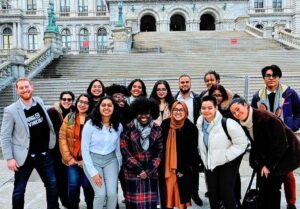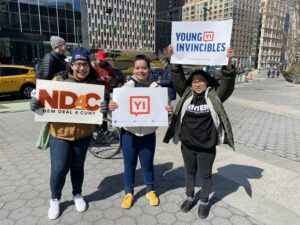
Thank you to all the young advocates, organizations, and community members who showed up and supported YI to elevate young adult voices in the political process!
New York faced a difficult state budget season that resulted in some wins ensuring affordable and accessible public higher education and health care for New Yorkers, but still faces many challenges as we navigate the complex political landscape of competing priorities between the state legislature and Governor Hochul’s administration.
As the state budget ends for this year, we saw both budget and legislative wins and losses. Our efforts included a culmination of storytelling, young adult testimony, sending letters to elected officials, rallying, and advocacy meetings with legislators to center young adult voices and have them lead the conversation.
How did we organize and mobilize? Our young advocates across the state came together on Students Take Albany day to meet with over 25 legislators to speak on key higher education and health care issues. Young Invincibles also partnered with CUNY Rising Alliance, CUNY University Student Senate (USS), CUNY Professional Staff Congress (PSC), the NY Healthcare for All Coalition, the NY and NYC Work-based Learning coalitions, The Education Trust New York’s Equity Coalition, members of our own Statewide Higher Education Basic Needs coalition and many other organizations to organize and speak up for young adult policy priorities, which helped secure some significant budgary and legislative wins for the 2024 budget.

Our Budget Wins
Higher Education
- Blocked tuition hikes for CUNY AND SUNY for in-state students. Rejecting the tuition hikes of 15-30% over the next 5 years was instrumental in ensuring public higher education remains as affordable for students in a state with a growing housing affordability crisis.
- Increasing the operating budget allocation by more than $100 million for CUNY. This win is part of our continued fight against decades of budget austerity and defunding of New York City’s 25 public higher education institutions.
- $2.4 billion in new funding for new capital projects for SUNY and CUNY. This investment allows for facility improvements across SUNY and CUNY, financing for new and renovated research buildings, and maintaining the infrastructure of SUNY and CUNY campuses.
-
- $1.3 billion for SUNY State-operated campuses
- $919 million for CUNY senior colleges
- $106 million for SUNY community colleges
- $120 million for CUNY community colleges.
Health Care
- Investing $100.7 million to fund abortion providers. This funding will increase Medicaid reimbursements and require private insurers to cover medication abortion when prescribed off-label for abortion. Moreover, part of the funding is dedicated to protecting patients’ personal data seeking abortion care regardless of state residency status.
Budget Misses
Higher Education
- CUNY did not receive designated funding to hire more full-time instructors, advisors, or mental health counselors. CUNY continues to depend on underpaid part-time faculty to teach and advise students. We need to designate investment to improve CUNY’s student-to-full-time faculty ratio and ensure all students have access to quality education, guidance, and mental health counseling.
- No significant investment into students’ basic needs, including food security, housing security, and mental health. Despite efforts from YI, Swipe Out Hunger, and other organizations and advocates, the governor continues to resist investing in students’ basic needs in higher education.
- The Hunger-Free Campus Act passed in 6 other states, was not included.
Health Care
- The governor did not include a 1332 waiver to provide health coverage to all low-income New Yorkers, regardless of their immigration status. This waiver comes at no cost for the state and would save New York taxpayers nearly $500 million in annual Emergency Medicaid costs for this same population.
- The Reproductive Freedom and Equity Act was not passed or funded. This act is a more comprehensive package that not only increases funding for abortion access but ensures accessibility to abortion services for non-NY residents, further protecting NY as a sanctuary state.
- Benefits under this program include coverage for transportation, lodging, and child care for abortion seekers that require additional support.
Legislative Wins
Higher Education
- Expanding access to abortion care to SUNY and CUNY students. As reproductive rights are at risk nationwide, state legislators ensure all students attending SUNY or CUNY will have access to abortion services if needed.
Health Care
- State officials required the State Department of Health to adopt a uniform application for Hospital Financial Assistance. This ensures hospitals use a uniform state-issued hospital assistance form, reducing the need for hospitals to sue patients for medical debt or send them into medical debt collection.
Legislative Misses
Health Care
- Ounce of Prevention Act was not passed. Similar to the uniform application for Hospital Financial Assistance bill, this act goes further to hold non-profit hospitals by linking their compliance to the bill to the amount of funding they receive from the state Indigent Care Pool fund.
Housing
- The plan to build far more affordable housing statewide was given up during the governor’s budget negotiations.
- Despite major support, we also saw a failure to pass New York’s Good Cause Eviction bill statewide (though it has been passed in Albany, Poughkeepsie, and Newburgh).
- Thus, New York continues to lack both key rental protections for the millions of young adults and families who must rent to live here and affordable opportunities for building economic security and wealth via homeownership.
Economic Justice
- Establishes the New York state community commission on reparations remedies saw no movement in the senate finance committee. The bill would give the reparations commission one year to conduct outreach and research the effect on affected communities.
